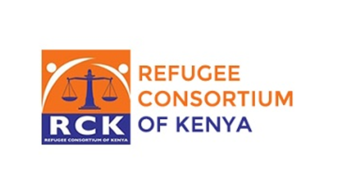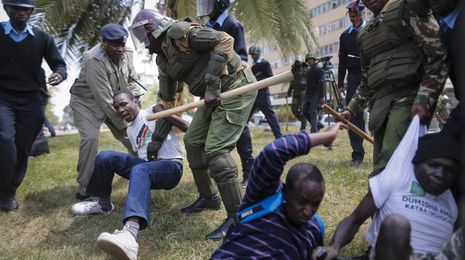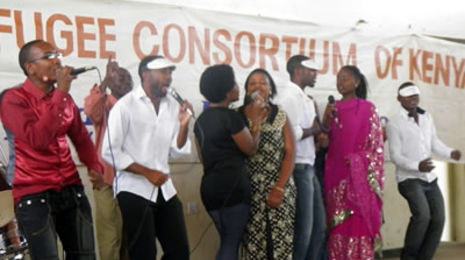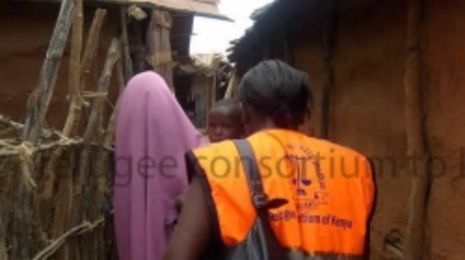Refugees have been seeking residency in Kenya since the 1960's, and today there are over half a million refugee's. However the attitude towards refugees in east Africa has not been welcoming. Many locals believe myths about refugee's like; they are fully supported by the UNHCR and other NGO's, or they are wealthy but not contributing to the economy. These myths diminish their reluctance to allow or support refugees in their communities. RCK completed a study, with the support of its sponsors like Danish Refugee Council, to survey and put to rest these myths (Myths and Truths). The main findings were there is an increased demand for refugee financial, community, and government support. Without this support the future for forced migrants is extremely grim.
From 1963 till 1989 nearly 20,000 refugees from Uganda, Sudan and Ethiopia sought refuge in Kenya were the government managed them using the Refugee Status Determination (RSD) process. During this time the first sources of “refugee law” came into existence to protect forced migrants’ rights. The main pieces of legislation were established at the 1951 Convention Relating to the Status of Refugees. Later the 1967 Protocol Relating to the Status of Refugees was also created. The third and final main piece of international refugee legislation, which was specific to Africa, was the 1969 OAU Convention Governing the Specific Aspects of Refugee Problems in Africa. All of these conventions created precedents and legislation which RCK uses to represent and stand for refugee’s rights today in Kenya (RCK.org, RAR).
Due to political unrest and civil war in Somalia, Sudan, Ethiopia and Rwanda the arrival of refugees in Kenya increased from 1990-2007. Roughly 400,000 entered the country, which sparked a demand and creation of four refugee camps that were later combined into two in Kakuma and Dadaab. Updated policy was called for and in 1999 the Kenyan government held a conference with major civil society players to discuss refugee law. RCK was among the groups asked to join this conversation along with other NGOs. As a result the Refugee Bill was created in 2000 and then after adjustments and being passed through parliament was official established in 2006.
Since the 2007/08 general election in Kenya there has been great unrest in the region over displaced individuals. Violence due to the election spread throughout the nation and hundreds were forced to leave their homes and nearly 1,300 displaced people were killed (Fulfilling the Promise Video). Hundreds of Internally Displaced People (IDP's) still live in refugee camps. Since RCK's creation in 1998 they have been advocating for victim of displacement and now also victims of the post-election violence. 2007 to present day is also marked by a great upsurge of terrorism and attacks throughout the country, including in camps. In 2014 a government Directive require all refugees to live inside one of the two refugee camps and limited the number of refugees inside Kenya to 150,000. The government wanted to round up the refugee’s and enforce strict encampment policy. This however, was challenged by movements, including RCK, as a violation to the freedom of movement establish in the Refugee Bill (Neil Wilson) .
Today the Refugee Bill of 2006 is under review because it does not adequately deal with issues of refugee reception, registration and residence. RCK is working to advocate on behalf of refugees and be a voice for them in the process of this review by the National Assembly.
Refugee Consortium of Kenya was founded in 1998 to address the declining refugee situation in Kenya and the wider region. Specifically it was founded to respond to a gap in legal assistance faced by asylum seekers and refugees in Kenya. At the time there were no other organizations that provided legal assistance tailored for refugees and asylum seekers. RCK grew over the next two decades due to the increasing need of refugees and continued to attract professionals and activist who had a passion for human rights.
Since 1998 RCK has made great strides in assisting refugees and asylum seekers. A couple of the main accomplishments are as follows. In 2006 the Refugee Act in Kenya was enacted, greatly because of the lobbying done by RCK. Before RCK was founded there was very little refugee law to govern asylum management in this region. Through continued lobbying the 2012 IDP Act was also later passed. This Act focused on "prevention, protection, and assistance to internally displaced persons and affected communities" (Refworld). In the past twenty years over 10,000 individuals received documentation, resettlement, and other services because of RCK's work. In 2014, the government issued a security law, attempting to find all refugees living in communities and placing them into refugee camps. This was combated by RCK and partnering NGO’s as it was considered a violation to one’s freedom of movement. Today, RCK is currently lobbying to update the Refugee Bill of 2006 to further define and increase refugee rights. Further, they are working in both Kakuma and Dadaab refugee camps, and in Nairobi to give legal assistance to forced migrants as well as trauma counseling.
Due to the nature of RKC, the desire for opportunity and equality for all refugees, the ideological composition of the members is predominantly liberal. From the organizations strategies, like lobbying the government and their partnership with UNHCR, it is evident they believe in the importance of governments’ role in providing for the people and combating social injustices. Also, RCK strongly believe individuals, including refugees, should have the right to move freely between borders and establish themselves in different communities.
RCK is part of a network of organizations that works to address the needs of persons of concern therefore most of its’ members have progress ideologies. Each organization in this consortium differs slightly in their ideological beliefs but all share the same end goal. Some of these organizations include: the Urban Refugee Protection Network (Kenyan), International Detention Coalition and International Council for Voluntary Agencies (International).
The Executive Director of RCK is Eunice Edonga-Githinji, and Senior Program Officer is Leila Murithia Simiyu. Underneath them are numerous Assistants Program Managers for each of the three departments; Legal and Social Justice, Advocacy and Policy Development, and Communications, Research and Monitoring, as well as Institutional Support Development. RCK is run mainly as a top-down organization with the biggest decisions being made by the Executive Director then set into place by the Program Officers below. Within each of the three departments work is delegated among the Program Managers and Officers. However, if one of the lower level staff members has an idea for future plans, the leaders are open, in regional meetings, to discuss and act upon them.
Further details on the specific structure of the organization were not available on the website. During the interview process, which due to his busy schedule and the time difference was done via email, I asked Mr. Andrew Maina about the structure of RCK and the social composition of the group. He referred me to a document on the website which no long has an active link. He failed to get back to me when I inquired further. However, from my understanding of RCK, their work, and their other platforms, it can be assumed most activist working on behalf of RCK are mid to lower class individuals with a passion for giving a voice to the voiceless. As a whole much of the official staff is in their mid-20’s to 50’s. Many are local Kenyans of both sexes; however, others are former refugees from a variety of eastern African countries who now work with the organization to promote rights for future refugees (RCK.org, Our Team) .




